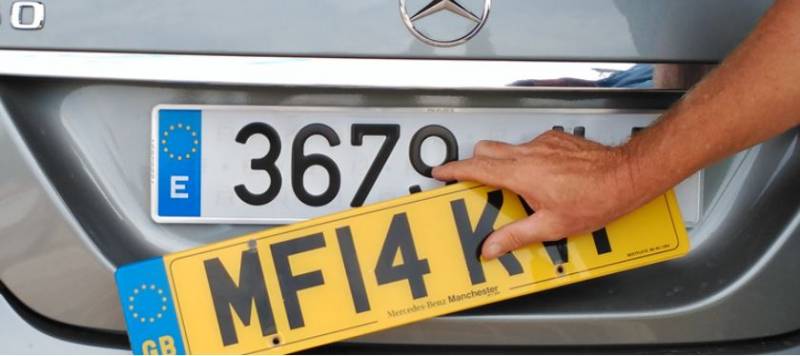Streamlined Process to Register a Foreign Vehicle in Spain for Expats
Streamlined Process to Register a Foreign Vehicle in Spain for Expats
Blog Article
Usual Obstacles Encountered During Foreign Automobile Registrations and Just How to Overcome Them
Browsing the intricacies of international car registrations can be an overwhelming task, filled with obstacles that vary considerably throughout jurisdictions. Concerns such as understanding regional guidelines, getting rid of language barriers in crucial documentation, and integrating discrepancies in vehicle requirements often arise.

Recognizing Neighborhood Regulations
Browsing the intricacies of foreign car registration begins with a comprehensive understanding of regional laws. Each country has its certain legislations and needs governing the registration of automobiles, which can differ considerably from one jurisdiction to another (Register a foreign Vehicle in Spain). It is critical for foreign lorry owners to acquaint themselves with these laws to ensure compliance and prevent possible penalties or lawful issues

Furthermore, some territories mandate automobile assessments to establish compliance with local safety and security and discharges criteria. This could necessitate adjustments to the vehicle before it can be lawfully signed up. Engaging with local authorities or seeking advice from lawful experts can offer clarity on these policies.
Language Obstacles in Paperwork
Language obstacles posture substantial difficulties when it comes to the documents required for international automobile registration. Many individuals experience difficulties in comprehending the particular requirements outlined in neighborhood regulations, as these files are commonly published in the main language of the host nation. Misinterpretations can result in the entry of incorrect or incomplete paperwork, resulting in delays or rejection of enrollment.
In addition, essential papers, such as title acts, evidence of ownership, and insurance plan, may not have readily available translations - Register a foreign Vehicle in Spain. This can create confusion for foreign vehicle owners that are strange with the local terminology and legal lingo. Because of this, browsing the registration process comes to be troublesome, usually calling for extra time and effort to guarantee compliance
To mitigate these concerns, it is a good idea for foreign car proprietors to seek specialist translation services or get in touch with regional professionals that can aid in recognizing the requisite paperwork. In addition, government agencies may provide multilingual resources or guidelines to promote the enrollment process. Proactively addressing language obstacles can improve the registration experience, ensuring that all called for papers are properly ready and submitted based on neighborhood policies.
Automobile Specification Discrepancies

Encountering lorry spec inconsistencies can produce considerable hurdles for foreign lorry proprietors throughout the registration procedure. These inconsistencies often emerge from distinctions in producing standards, dimension systems, and regulatory demands between the vehicle's country of origin and the host nation. A car that fulfills safety and security and emissions standards in one nation may not straighten with the specs needed check that for registration in an additional, leading to hold-ups or straight-out beings rejected.
To get over these challenges, it is vital for international automobile owners to conduct complete research prior to initiating the registration procedure. This includes recognizing the specific needs established by the neighborhood authorities, such as safety and security standards, emissions degrees, and any necessary alterations. Engaging with an expert service concentrating on international lorry registration can also provide beneficial understandings and support in navigating these discrepancies.
Documentation plays a key role, so ensuring that all technical specifications and modifications are properly shown in the paperwork can minimize issues. Furthermore, keeping open communication with local enrollment authorities can provide quality on any potential inconsistencies, permitting timely resolution and successful enrollment of the automobile.
Browsing Tax Obligation Requirements
Recognizing the tax obligation requirements linked with foreign car registration is necessary for owners looking to follow local policies. Each jurisdiction has details tax obligation responsibilities that have to be fulfilled before an automobile can be legitimately registered. These may include import duties, value-added taxes (VAT), and annual vehicle tax obligations, which can vary substantially depending upon the lorry's beginning, worth, and specifications.
To browse these tax demands successfully, vehicle proprietors should start by investigating the particular taxes applicable in their location. Consulting with neighborhood tax authorities or a tax expert with experience in international car enrollments can give quality on the process and prospective see this here responsibilities.
In addition, it is important to keep thorough paperwork of the vehicle's purchase and any type of settlements made, as this will be needed for tax obligation calculations and possible audits. Owners must also know any deadlines associated with tax settlements to stay clear of fines or hold-ups in registration.
Inspection and Conformity Issues
Routinely dealing with inspection and conformity problems is important for proprietors of international automobiles seeking to register them in a brand-new jurisdiction. Each region has distinct laws relating to vehicle safety and security, discharges, and modifications, which can present significant obstacles for owners strange with local criteria. Comprehending these demands is essential to prevent hold-ups and additional costs.
One usual problem occurs when foreign automobiles do not satisfy the host territory's safety and discharges requirements. Owners must proactively validate that their vehicles follow local policies, which may involve alterations or obtaining required paperwork from makers. Furthermore, lots of jurisdictions need a detailed evaluation by a licensed center, which can cause additional issues if the car fails to satisfy specified requirements.
To browse these obstacles, proprietors can seek advice from local lorry registration authorities or seek support from professionals familiar with the enrollment procedure. Preparing all needed paperwork in breakthrough, consisting of previous assessment records and evidence of conformity, can streamline the registration procedure. Ultimately, extensive prep work and understanding of assessment requirements more information can considerably enhance the chance of an effective foreign vehicle registration.
Verdict
In recap, the process of international vehicle registration entails different challenges, including understanding of neighborhood regulations, language barriers in documentation, inconsistencies in lorry requirements, navigation of tax obligation requirements, and assessment and compliance problems. Dealing with these obstacles demands attentive study, usage of expert translation solutions, and consultation with regional authorities. Involving specialized solutions can guarantee adherence to safety and security and discharges standards, inevitably helping with a smoother enrollment procedure and conformity with all appropriate commitments.
Report this page